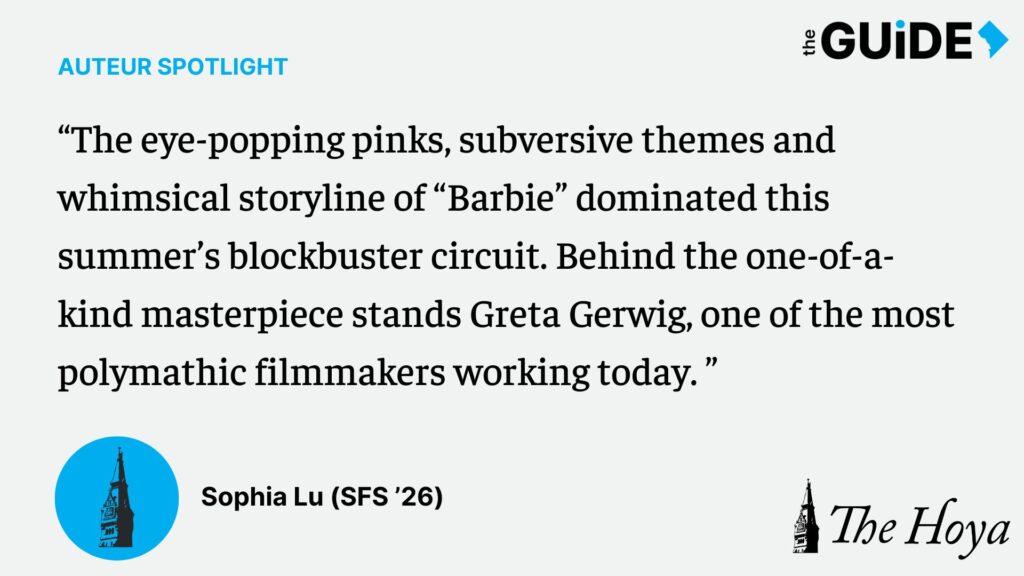The eye-popping pinks, subversive themes and whimsical storyline of “Barbie” dominated this summer’s blockbuster circuit. Behind the one-of-a-kind masterpiece stands Greta Gerwig, one of the most polymathic filmmakers working today. Her incredible hit was not just a fluke, but rather the latest addition to a young but storied filmography.
I’ve been a long-time Gerwig admirer running all the way back to my first viewing of her directorial debut “Nights and Weekends” (2008). A low-budget, low-profile production she co-directed with Joe Swanberg, “Nights and Weekends” brought Gerwig a cult following within the indie scene. She’d already developed a dedicated fanbase as an actress before her foray into directing, but the well-received film elevated her to be similarly regarded for her work behind the camera.
From the character-driven plot to the naturalistic acting, some of the distinctive features that have come to define Gerwig’s directorial style were on full display in “Nights and Weekends.” The 80-minute-long mumblecore film, which stars Joe Swanberg and Greta Gerwig herself, follows James and Mattie (portrayed by Swanberg and Gerwig, respectively), a young couple in love, through the loss and disappointment they experience together over the course of a long-distance relationship.
Gerwig’s first solo feature came in the form of 2017’s “Lady Bird,” a huge breakthrough for Gerwig and the entire cast of actors, including Saoirse Ronan, who plays the titular character, and Laurie Metcalf, who plays Lady Bird’s mother. The film focuses on a teenage girl’s coming-of-age story as she struggles with the confines of her surroundings amid her yearnings for adventure and stimulation. Lady Bird’s tumultuous relationship with her mother reflects this internal struggle: she fails to understand how her mother can live a satisfied life as a housewife when she craves so much more herself than what her hometown of Sacramento, California, offers.
After an incredibly successful box office run, “Lady Bird” earned Gerwig glowing critical responses and ultimately five Academy Award nominations.
When she signed onto “Little Women” (2019) for her third project, Gerwig tested her expertise in the industry. By authorizing her to direct an adaptation of “Little Women” — which had been translated to the screen six times before — Sony Pictures gave Gerwig their ultimate vote of confidence. Gerwig produced an exceptional and refreshing take on the acclaimed story that surpassed even the highest expectations.
Audiences were enamored by Gerwig’s spotlight on women’s struggles from the perspective of women themselves. Not only were all four March sisters fully developed as characters with their own personalities, hopes and dreams, none were lost in the flurry of plot activity. “Little Women” grossed $218 million worldwide and received five British Academy Film Awards nominations, six Academy Awards nominations and nine Critics’ Choice Awards nominations.
With incredible credentials under her belt, Gerwig came into 2023’s “Barbie” with substantial latitude. She took the authority afforded to her and ran with it, leaving an undeniable mark on an icon that has persisted in American culture since the 1950s. “Barbie” dominated the public consciousness during the entire summer.
It was no coincidence that almost a quarter of those who watched “Barbie” hadn’t been to the theater since before COVID-19. A singular cultural event, the blockbuster, reinvigorated interest in original ideas and stories, which bodes well for the future of cinema amid Hollywood’s current obsession with franchises (see: the ever-multiplying number of marvel projects or the just-released millionth sequel to “The Fast and the Furious”). Gerwig’s status as a true auteur, built up over the years from all her projects, shone through on a film that was always likely to be a critical darling but ended up being so much more.
Gerwig made cinematic history with “Barbie” as not only the highest-grossing director of a Warner Brothers film ever, but also the highest-grossing female director of all-time. Heading into the awards season, “Barbie” is primed for even more recognition for the ingenuity of its concept and the all-around excellence of its production.
We need more auteurs like Gerwig because they infuse the big screen with distinctive perspectives and iconic visual styles that make cinema so impactful. As for me, I’m grateful for Gerwig’s commitment to promoting independent films, showcasing women’s stories and creatively reinventing stories for a new generation.














